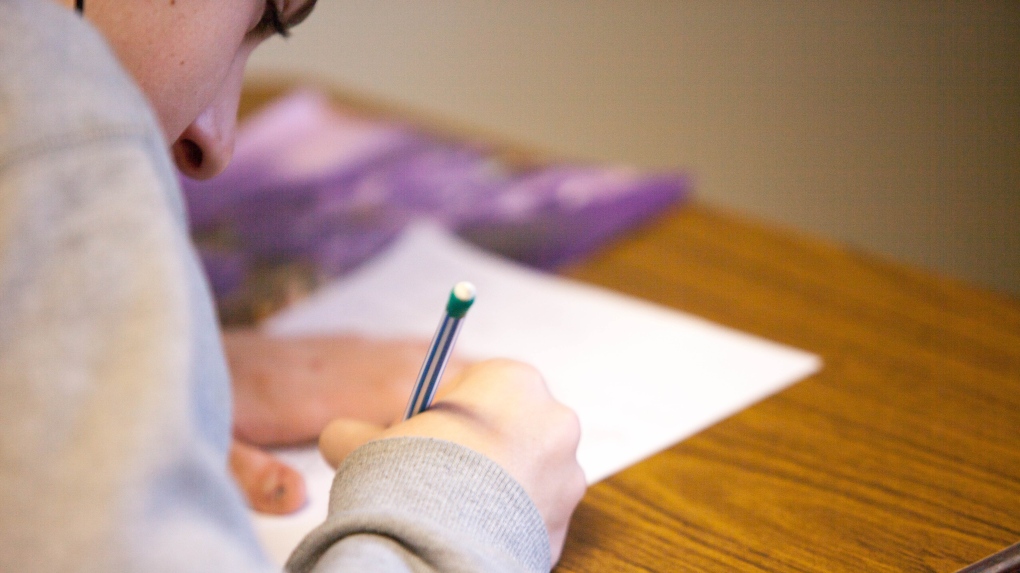'Ungrading': How one Ontario teacher is changing her approach to report cards
 Photo by Ben Mullins on Unsplash
Photo by Ben Mullins on Unsplash
An Ontario high school teacher plans to continue with an alternative method of grading her students in the new school year after an experiment last semester.
Stacie Oliver teaches at A.B. Lucas Secondary School in London, Ont. and recently began a new method of determining her students’ midterm and final grades.
Speaking on Newstalk 580 CFRA’s Ottawa Now with Kristy Cameron, Oliver said she and her students work together on grades twice a year, at midterms and at the end of the semester.
“The students propose their own grade at those two points and then they have to justify and prove to me that they have earned that grade,” Oliver explained.
“We have digital portfolios that they create throughout the semester that showcases not only their best work, but also all of the attempts they made along the way to get to that ‘showcase piece’, which is what they deem to be the best representation of their learning.”
Oliver says students must prove their work meets the expectations in the provincial curriculum.
“They understand the curriculum document very well and can speak to how their work meets and/or much of the time exceeds those expectations,” she said.
Known as “ungrading,” Oliver said the method is about changing the understanding of how to measure success in learning.
“There is lots of evidence that suggests that grades are very subjective,” she said. “It’s difficult to be able to objectively say, ‘This number is the number that truly captures the learning.’ What that might be in my classroom -- is that the same across another department, another subject area, another school?”
But the bigger aspect, Oliver says, is how students tie self-worth and identity to their grade number.
“What ends up happening is they don’t feel that everything is futile because they can continue to do it—whether it’s a task or practice a skill—they can continue to practice it until they’re satisfied that they’ve met that. I think that that’s really important and it does fuel students because they then want to learn and they want to get better,” she said.
Oliver said students in every classroom have differing attitudes on grades. She says the ungrading experiment allows students across that spectrum to take ownership of their learning.
“What ends up happening is they don’t feel that everything is futile because they can continue to do it—whether it’s a task or practice a skill—they can continue to practice it until they’re satisfied that they’ve met that. I think that that’s really important and it does fuel students because they then want to learn and they want to get better,” she said.
Oliver said she retains the authority, as teacher, to tell a student they haven’t justified the grade they may be arguing for, but says most students’ evaluations of their work are pretty close to her own.
“If I did have to change a grade, which was not a lot of the time, I was raising grades. I’ve had students tell me they don’t want to seem arrogant or think too highly of themselves, so they give themselves a lower grade than they might otherwise have done,” she said.
Oliver says her principal and school board approve of the grading scheme, and she plans to continue it in the fall.
“My principal has a strong interest in this thing we’re calling ‘ungrading’ and so he’s been very supportive right from the very beginning, as has the board, so it’s been great.”
CTVNews.ca Top Stories

'Anything to win': Trudeau says as Poilievre defends meeting protesters
Prime Minister Justin Trudeau is accusing Conservative Leader Pierre Poilievre of welcoming 'the support of conspiracy theorists and extremists,' after the Conservative leader was photographed meeting with protesters, which his office has defended.
What is changing about Canada's capital gains tax and how does it impact me?
The federal government's proposed change to capital gains taxation is expected to increase taxes on investments and mainly affect wealthy Canadians and businesses. Here's what you need to know about the move.
'My stomach dropped': Winnipeg man speaks out after being criminally harassed following single online date
A Winnipeg man said a single date gone wrong led to years of criminal harassment, false arrests, stress and depression.
Bank of Canada officials split on when to start cutting interest rates
Members of the Bank of Canada's governing council were split on how long the central bank should wait before it starts cutting interest rates when they met earlier this month.
Pilot reported fire onboard plane carrying fuel, attempted to return to Fairbanks just before crash
One of the two pilots aboard an airplane carrying fuel reported there was a fire on the airplane shortly before it crashed and burned outside Fairbanks, killing both people on board, a federal aviation official said Wednesday.
'One of the single most terrifying things ever': Ontario couple among passengers on sinking tour boat in Dominican Republic
A Toronto couple are speaking out about their 'extremely dangerous' experience on board a sinking tour boat in the Dominican Republic last week.
Quebec nurse had to clean up after husband's death in Montreal hospital
On a night she should have been mourning, a nurse from Quebec's Laurentians region says she was forced to clean up her husband after he died at a hospital in Montreal.
7 surveillance videos linked to extortions of South Asian home builders in Edmonton released
The Edmonton Police Service has released a number of surveillance videos related to a series of extortion cases in the city now dubbed 'Project Gaslight.'
Ukraine uses long-range missiles secretly provided by U.S. to hit Russian-held areas, officials say
Ukraine for the first time has begun using long-range ballistic missiles provided secretly by the United States, bombing a Russian military airfield in Crimea last week and Russian forces in another occupied area overnight, American officials said Wednesday.

































